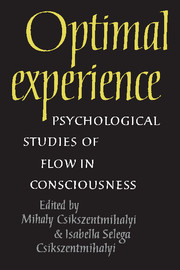Book contents
- Frontmatter
- Contents
- Acknowledgments
- Contributors
- I A THEORETICAL MODEL OF OPTIMAL EXPERIENCE
- II VARIETIES OF THE FLOW EXPERIENCE
- III FLOW AS A WAY OF LIFE
- 11 Introduction to Part III
- 12 Modernization and the changing contexts of flow in work and leisure
- 13 Ocean cruising
- 14 Flow in a historical context: the case of the Jesuits
- IV THE MEASUREMENT OF FLOW IN EVERYDAY LIFE
- References
- Name index
- Subject index
12 - Modernization and the changing contexts of flow in work and leisure
Published online by Cambridge University Press: 05 June 2012
- Frontmatter
- Contents
- Acknowledgments
- Contributors
- I A THEORETICAL MODEL OF OPTIMAL EXPERIENCE
- II VARIETIES OF THE FLOW EXPERIENCE
- III FLOW AS A WAY OF LIFE
- 11 Introduction to Part III
- 12 Modernization and the changing contexts of flow in work and leisure
- 13 Ocean cruising
- 14 Flow in a historical context: the case of the Jesuits
- IV THE MEASUREMENT OF FLOW IN EVERYDAY LIFE
- References
- Name index
- Subject index
Summary
Cultures differ enormously in terms of the range of opportunities they make available to the people who live in them, and in terms of the skills that the average inhabitant feels he or she possesses. The same culture may vary dramatically along these dimensions at two different points in time. Therefore the quality of subjective experience of a typical member of society will also vary. These days, when anthropologists are more than ever hesitant to breach the neutrality of cultural relativism, and when imposing Western standards of interpretation and description on foreign cultures has become a heresy to be avoided at all costs, it might be that focusing on the self-reported experiences of native respondents will provide a viable comparative method.
Accordingly, this chapter reports on extensive interviews with four European groups that, although living in close geographical proximity, are part of very different ecologies and cultural environments. They differ especially in the degree to which they still follow a traditional agricultural lifestyle, as opposed to being integrated with the technological life of the cities. The purpose is to compare how optimal experience is described in such contexts, to see what different activities it is experienced in, and to infer the effects that modernization is having on the quality of subjective experience.
- Type
- Chapter
- Information
- Optimal ExperiencePsychological Studies of Flow in Consciousness, pp. 193 - 213Publisher: Cambridge University PressPrint publication year: 1988
- 52
- Cited by

